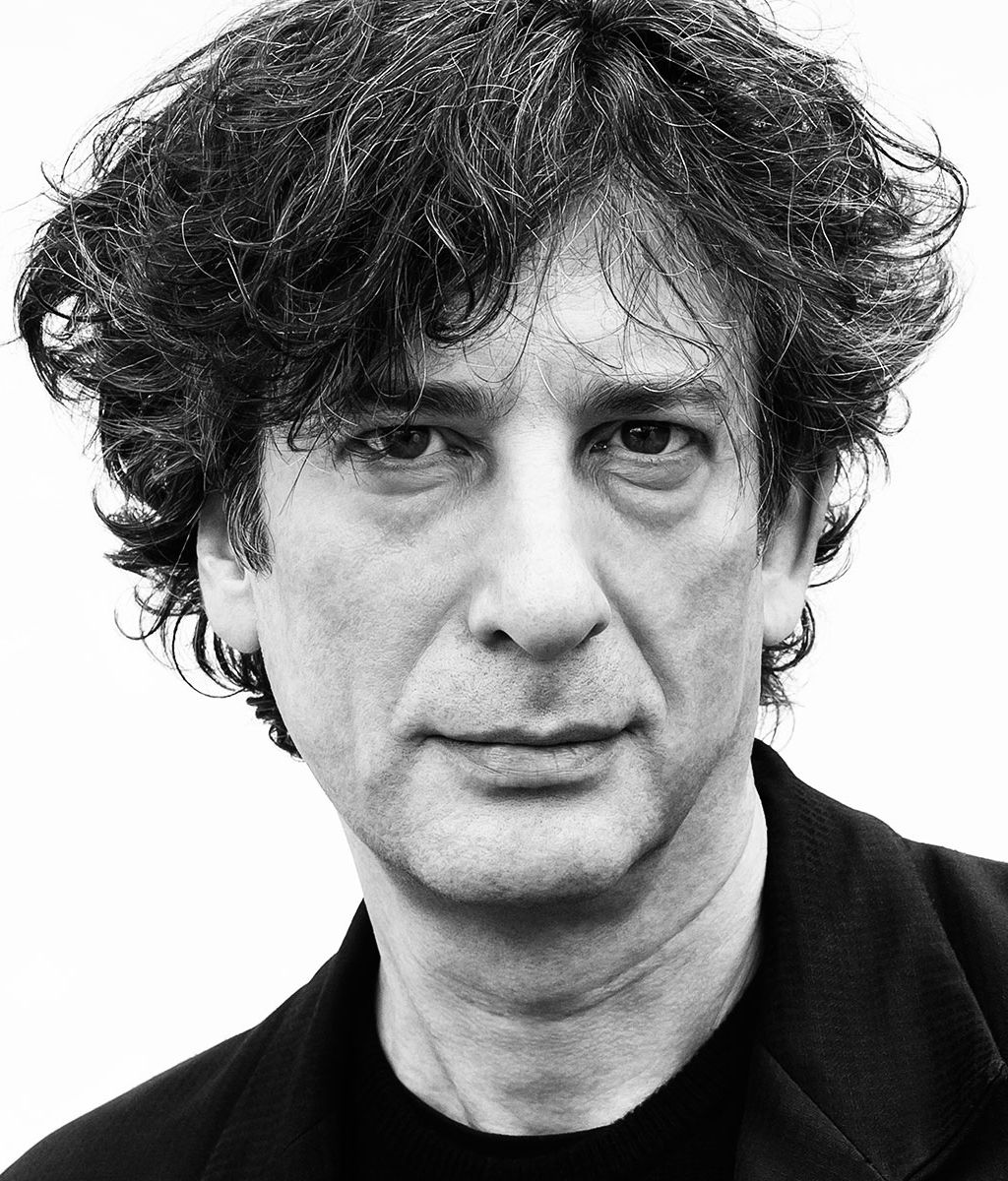There’s a scene early on in American Gods, the best-selling 2001 fantasy novel by Neil Gaiman, where someone accuses a man of being a “hustler.” “But that is the least of what I am,” the man replies. “On the whole, I make my money from people who never know they’ve been taken, and who never complain, and who will frequently line up to be taken when I come back that way again.” Gaiman, himself, is that same sort of hustler-plus — a weaver of fictions who slips past your mental defenses and toys with your thoughts, not just stealing the minds of his legions of fans, but making them beg him to steal them again and again.
The 56-year-old Englishman got his start writing thoughtful twists on superhero comics in his native country, then broke big with his surreal fantasy-comic epic Sandman in the late 1980s and early ’90s. Since then, he’s amassed a worldwide following for his prose, penning best seller after best seller: Anansi Boys, Coraline, The Graveyard Book, Good Omens (with the late Terry Pratchett), The Ocean at the End of the Lane, and Fragile Things, just to name a few.
But American Gods is perhaps the best-known of the bunch. It follows the tribulations of Shadow Moon, an ex-convict who wanders the U.S. — Gaiman’s adopted country for more than two decades — alongside a mysterious con man named Mr. Wednesday. Along the way, Wednesday and Shadow link up with ancient gods from an array of Old World pantheons, all of whom are living in obscurity in the hidden corners of a decaying America. Wednesday, who may or may not be a god himself, recruits them all to fight a war against the New Gods: media, technology, and the like.
Sixteen years after its publication, American Gods is getting new life in the form of a televised adaptation on Starz, on which he is an executive producer. In the hands of showrunners Bryan Fuller and Michael Green, Gaiman’s tome becomes a grand, bloody, stylized, sexy, relentlessly clever meditation on migration, race, inclusion, collective memory, sexuality, and gender. It’s also arguably more of its time now than it was when Gaiman sat down to pen it, at the turn of the millennium. We caught up with the lanky, black-clad, shaggy-haired Gaiman at a high-end Japanese restaurant in Chicago to talk about Jewish mysticism, pony sushi, Nazis, superheroes, Donald Trump, and the times he’s been mistaken for Howard Stern.
It’s fitting that we’re meeting in Chicago, given the pivotal role it plays in the novel and the show.
And given that I still think it’s my finest ever sentence.
What is?
“Chicago happened slowly, like a migraine.” Anyone who’s ever driven into Chicago from somewhere else, you go, “Oh, we’re in Chicago!” It slowly creeps up on you.
There’s this possibly bullshit story about how Philip K. Dick wrote The Man in the High Castle that I often think about. He allegedly one day just thought of a name: “Mr. Tagomi.” Came out of nowhere. Then he consulted the I Ching about what that name meant and came to the next element of the book, then the next one, and so on. What was your Mr. Tagomi for American Gods? What was that first kernel from nowhere?
That’s a really good question. There are two answers, and they’re both true. I had a bunch of stuff that began, in my head, with the image of two men meeting on a plane. That was my Mr. Tagomi. And it was this thing that I would think about before I would go to sleep. And I would just run this conversation through. I went, I know there is this old guy and he seems to be some kind of hustler. And there is a younger guy and I think he just got out of prison. And there’s no way that Person A should be on Person B’s … They shouldn’t be sitting next to each other. He’s been bounced up [to first class], but when he finally sits down on this plane, the guy opposite looks at him and says, “You’re late.” And then offers him a job. And I’d think about this as I went to sleep each night. It would be my weird little thing, and it would just start with two people, and then it would grow a little bit more, and then it would grow a little bit more. But all I really knew was there were two people.
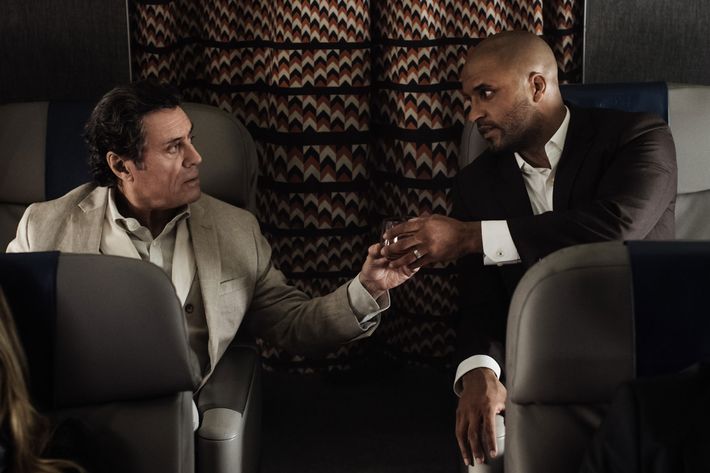
And they were men.
And they were men. And the younger man was going to wind up working for the older man, who was some kind of magician. Bits of their stories would start to accrete. But I still hadn’t really made it into a thing. And then there’s the second half of the story. And the second half of the story has gotta be July ’98. But right now, I no longer trust my memory in any way, having confidently asserted for years that Terry Pratchett and I met mid-February, 1985, in a Chinese restaurant. And I found my 1985 desk diary last night. I went through it, and I couldn’t see us in February anywhere. I went back and we were on the 21st of January in an Italian restaurant.
But this is how I remember it. It was ’98, and I was going to Norway and Denmark to do book events. And my travel agent had said to me, “Y’know, if you fly Icelandair, they’ll always give you a free stopover in Iceland, in the hopes you’ll spend tourist dollars there.” And I went, “Wow! I’m in. I’m sold.” So I get off and it’s like six o’clock in the morning in Iceland. And I go through customs and I think, Well, I’ll wait until it gets dark and then I’ll go to sleep. That night, there is no dark. I do not have eyeshades and the bedroom curtain is very thin and very white and doesn’t do anything. And it’s day. And I do not sleep. So the next day is Sunday, and at this point it’s been a couple of days since I’ve actually slept, and I’m wandering around in that weird flat place you get to when you haven’t slept and everything just feels meaningless. And it’s all a little bit surreal and everything’s closed. So I remember passing a sushi place and just reading the menu because there was nothing else to do and it was closed — I saw they sold pony sushi.
Pony sushi?
Pony. Because Iceland, what it actually has a lot of, is ponies. And then I walk into the downtown tourist office, now closed, and they had a fantastic tabletop diorama basically showing the voyages of Leif Erikson. You start out in Iceland, you nip over to Greenland, you go down the coast in Newfoundland and have a little thing where you build your huts, and so forth. I looked at it and I thought, Y’know, I wonder if they brought their gods with them. And then I thought, I wonder if they left their gods behind when they came home. And it was like, all of a sudden, all of the things that I’d been thinking about, all of the things that had been circling my head about immigration, about America, about the House on the Rock, and this weird American thing where … In other places in the world, they might look at a fantastic cliff and go, “Ah, here we are in touch with the numinous! We will build a temple or we will build a shrine!” In America, you get a replica of the second-largest block of cheese in the world circa 1963. And people still go to visit it! As if it were a shrine! I wanted to put that in. And it was all there. I wrote an email to my agent and my editor saying, “This is the book,” and ending with, “The working title is going to be American Gods, but I’m sure I’ll come up with something better.”
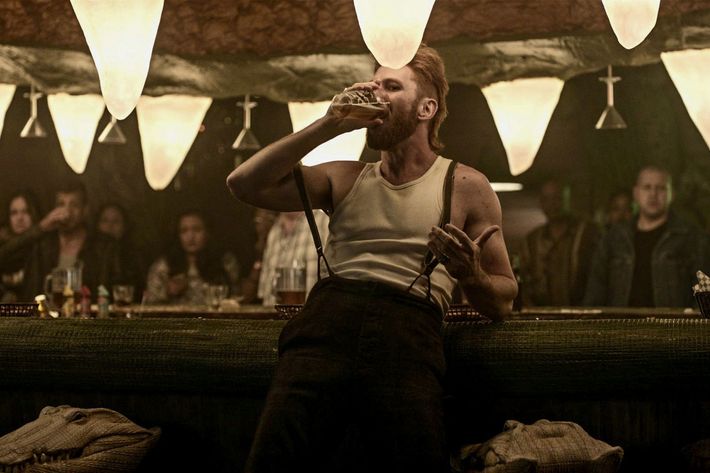
The one religious tradition that doesn’t really come up in the show is Judaism. Which is curious, since you, like me, are Jewish.
You know, that’s interesting, because the god Bilquis, in the book, comes from the Jewish tradition. Bilquis is absolutely the Queen of Sheba, and she’s there at the beginning.
But that’s a bit different. She comes from a Jewish text, but there’s very little in the show that’s immediately identifiable as Jewish in the way that there is for so many other religious traditions. There’s no Yahweh.
Look, people say to me, “It’s American Gods, so where is God?” And, I say, “Well, what does God look like? Are you sure God isn’t in there somewhere?” People who will argue for the immanent, invisibilistic, un-bodied nature of God will get grumpy that I didn’t put an old guy on a white cloud in American Gods.
And I guess that’s playing into the Jewish tradition: Our God is faceless. It’s our killer app. He can kind of be anything you want Him to be, on some level.
Yeah, He had no face. There was no beard; there was no name. And I love that! For me, American Gods is so much more about culture and trappings. I mean, Bryan [Fuller] is much more interested in the religious side of things, in a weird way, than I am. When I came up with the idea, it was, This is about culture. It’s about immigration. It’s about coming to this country with your stuff and losing it, and giving it up. And so, for me, the external trappings are fascinating. Getting deeper into American Gods, I would love to get into rabbinical traditions and so much more. There’s a scene toward the end where you see the Golem, right at the very end of the book. But I think the nature of Judaism is such that you can’t stick a person up on the thing. So, you go with the bits of cultural detritus.
Which one reads about in the weird scriptures that 80 people wrote, and which all contradicted one another and in which we tell the same stories multiple times. We’re that rare religion that has two creation stories that contradict one another.
I love that. In the Noah’s ark description, you have two texts one after another, completely contradicting each other on how many of what kind of animal turn up where. That’s awesome!
I sat on a press roundtable with you a few years back where you mentioned something about learning the weird parts of Judaism from an adult in your life, but you didn’t get too deep into it. Am I remembering that right?
That was the Reverend Meyer Lev. When I would go, for bar mitzvah lessons, to live with my relatives in North London, it was Reverend Lev who would come over every day and would try and teach me. And the tragedy was that all of the stuff I was really interested in was this sort of weird, gloriously mad stuff, which it took me years to find later. And I never found it told as well. And, the big, obvious one was Adam’s three wives, which was the kind of thing that he would just normally tell me. And my task — as I saw it, at least — was to get him off the subject of the fact that I probably had not sufficiently prepared my haftarah that day. And his job was to try and make a small orthodox Jew out of me, against all odds. Would you like some of this salad?
Sure. And you should have some of this shrimp.
Okay. [Grabs a shrimp.] So, it was absolutely fascinating for me, getting these weird lessons in Jewish mysticism — and I thought I was getting Judaism 101. It honestly wasn’t until much later in life that I’m going, “Oh, I got the weird shit.” [Laughs.] And that was very good for me. It was also good that he was somebody who genuinely had no concept of fiction.
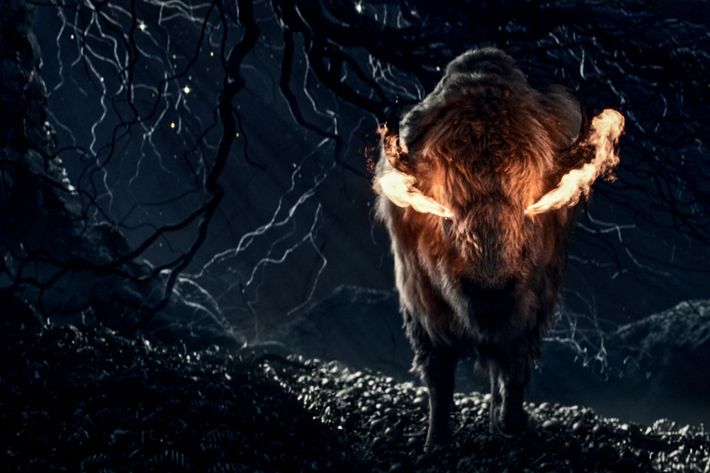
There wasn’t a distinction?
All stories had happened, for him. He was telling me a story — the one about the old man lost in the forest one night without his prayer book who
says, “God, you created all things so I am going to recite the alphabet and you can put the words together” — which I had already encountered in The Joys of Yiddish by Leo Rosten as a funny story, I am being told as a true thing that happened to somebody of some rabbi’s acquaintance in
the 16th century by Reb Lev. And it was wonderful! Because I’m going, “No, you really believe this world. You are not in a world in which there is even a concept of a parable. Nobody can be made up. Everything has to be true. And everything has to be discoverable.”
But it was fun when I first sat down with American Gods, sat down to write it. I’d lived here, in America, at that point, for about eight years. And I had come to the conclusion that it was a lot weirder than I thought it would be when I moved over here. Really, it started out with me just going, I want to talk about what a weird place this is. I would comment on it to locals, who would fail to notice the weirdness. Much in the way that you’re a goldfish and you’re in a different goldfish tank, and you’re going, “Is this water weird?” And they go, “No, this is water.”
Mentally and emotionally, what place were you in while you were writing American Gods?
I don’t think anybody’s ever asked me that before. It was weird. Professionally, I’d finished Sandman a couple of years earlier. From pretty much the point that Sandman was finished, I basically spent about two years mostly writing movie scripts. I was not in a terribly good place, professionally, because every movie script that I wrote just got rewritten, and normally it was me rewriting it until eventually I gave up. And I couldn’t really see the point. I’d done [the BBC TV series] Neverwhere, which had been frustrating for me. I wanted to be in control. And I also had this weird idea that I wanted to write a big book.
Literally, physically big?
Literally, physically. I would describe it to people as a brick. I like short things. They make me happy. I feel like most books are too long. Most things are too long. But I also felt like, with [my novel with Charles Vess], Stardust, I’d done something really clever, because it was packed incredibly tightly — but nobody had really noticed. And I’m going, Okay, that was really interesting. I think I need to do something that is big enough for people to notice. You won’t even have to like it. But you will notice it.
Actually, I think I’m lying. This is one of those moments where I’m actually trying to … After that Terry Pratchett thing, I’m feeling so fucking self-conscious about the layers of story that you build up afterwards.
It’s like Reb Lev: All the contradictory stories are true, somehow.
They are all true. It is definitely true. I don’t know if I thought I needed to write a brick, ‘cause, as I’m saying this, I do remember that most of the year 2000 was spent feeling like I was trudging toward the horizon. I think I probably set out to write a 100,000–120,000-word book. And it was only when I was like 50,000 or 60,000 words in and I was still at the beginning that I realized that okay, this is a brick. At which point I owned my brick-ness. So the other question is, where and who I was when I was writing it. For the first chunk of it, the very first chunk of it, I was someone on a train.
You like trains?
I like the freedom that trains give you to not do anything else. And I did this particular train trip where you get on a train in Chicago, you get off the train in Los Angeles. I was going to San Diego Comic-Con. I wrote it in first person and wasn’t happy with it, but wasn’t sure why not. And I put it aside. That would have been July or August of ’99. And then November, after Thanksgiving, I went, Y’know, it needs to be third person. There’s a weirdness to anything to do with American Gods to me, in that Shadow is the least helpful character that I’ve ever created.
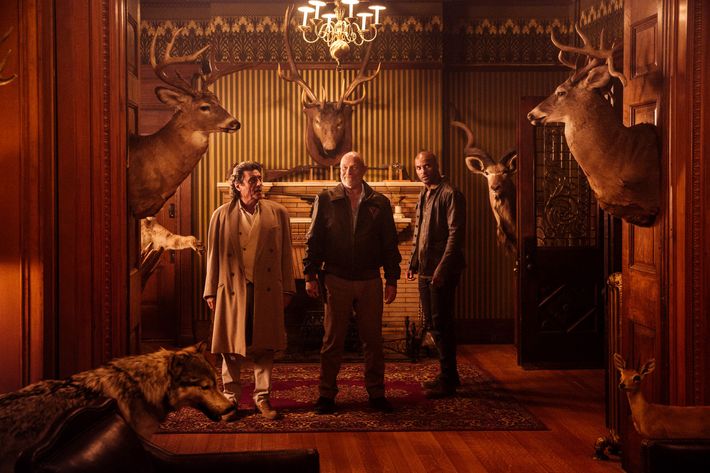
Helpful to you?
Helpful to a writer, yeah. Because he’s smart, but quiet. And relatively stoic. And is perfectly willing for things to happen to him and to get himself out of trouble if they’re getting bad. He doesn’t give you a lot as an author. And he doesn’t necessarily give you a lot as a reader. I remember I’d sworn a mighty oath that I would not cut my hair or my beard until I had finished the draft of my book. And I think the beard went off at the end of the first draft and then I went, Okay, haircut is at the end of the second draft. And then it started getting more and more important to me to get to the end of the second draft because people were starting to make Howard Stern jokes. Just walking down the street, people would be like, [American accent] “Whoa, Howard Stern!” “Hey! Are you Howard Stern?” It’s like, “No, I’m not fucking him. And I don’t even look like him.”
That’s a decent American accent!
Thank you.
Speaking of accents and travel: American Gods is largely an immigrant story, as well as the story of a nonwhite person traversing a majority-white country. When did you realize that the show was going to take on a weird political significance due to the rise of Trumpism?
It really wasn’t until the latter days of the election. I got a phone call on the day before the election, from The Guardian, saying, “Will you write us an editorial for what’ll happen if Trump wins?” And I said, “No.” [Laughs.] I didn’t want to go there. And I didn’t want to go there mostly because I was terrified it would happen. I have this mad theory about American elections. There is a reality-TV quality to them, in that they tend to go to what people think would probably be the most interesting story. “Who’s more interesting? Who’s a better story? Bob Dole or Bill Clinton? Let’s go for Clinton, it’ll be more interesting!” And there is that point where you’re going, “Okay, so is it Hillary, who still feels kind of like a rerun? Or is it Trump?” Even articulating that as a theory means that people are going to mishear what I’ve said. It will turn into a clickbait headline and people will be going, “You said that Trump was a better story!” No. I think Trump is an out-of-his-depth idiot. Who is possibly criminal. And certainly incompetent. I think that, actually, having a sane and functional right wing is a good thing. Having what we’ve got right now is a bad thing.
When the novel was written, it was written about America as a country of immigrants, of people who either came here of their own free will, or escaped here, or were brought here against their will. And what that meant — talking about the religious traditions and talking about the cultural traditions and talking about what that became. And having a lead character who was racially — and in all other ways — a melting pot. That, when I wrote the novel, didn’t seem to me to be particularly problematic, difficult, or even praiseworthy! Things that I did not think were praiseworthy or sensible included writing about indentured servants and transportation. Writing about the slave trade. Writing about a gay, Muslim salesman encountering a genie who drives a cab in New York.
I wasn’t doing it for the credit. I was doing it because it all feels right if you’re talking about America. Suddenly, Trump came in and now I’m reading articles in Vanity Fair about, “This is the most political stuff you’ve ever seen.” Well, I guess that’s all true, but it’s not like we sat down and went, We are the opposition. We simply started telling our fucking story and then the world changed. It would be like telling a pro-Jewish story in Berlin in the 1930s, and suddenly you’re looking around going, “We’re apparently doing something big and important.”
The other thing is, we don’t have Trump without Twitter. The show is harshly critical of media addictions. I hate to ask an overly big question, but do you think the internet has been a net negative for humanity?
I don’t know. What about fire and the blade? I can absolutely imagine people going, You know, I thought fire, when it came in, was so great because we were able to cook, and now — somebody else burned to death! Ditto sharp blades and weapons. I think it’s a tool. The phenomenon of the long-tail [effects] was one that nobody thought about when the whole thing started. Geek power happened, in a weird kind of way, because there was somebody like us in every small town. In the 1950s and ’60s, we didn’t find each other. By my time, in the ’80s, we found each other at conventions. But there’s only one of us in each town. And then the internet suddenly means that each of those people in each of those towns gets to find all the other people like them. And suddenly, they’re empowered. And they are mighty. And that is glorious. What we didn’t think was, And by the way, in each of those towns, there’s also a Nazi. There’s a Nazi who’s too ashamed, too embarrassed, or too socially unwilling to stand up there and go, “Yes! I happen to be a Nazi!” Which was actually kind of a good thing. And the fact that all of those Nazis got to meet each other on the web and get together and go, “Hey, I am not alone! Look! There’s a million people like me.” And it’s like, yeah, there are — that doesn’t make it a good thing.
That said, you’ve been able to use your online presence to significantly bolster your career. You’ve said in the past that your following makes you “critic-proof.” Is that a bad thing?
I’m not honestly sure, in any real sense, what function critics have in terms of selling books, anyway. Sandman was critic-proof. The reviews tended to be very consistent. They were always: “It’s not as good as it used to be.”
And I bet that began right away. “Issue two? Meh, not as good as issue one.”
I’d say issue seven or eight. “That’s not the thing that we liked!” Part of what you do to try to remain relatively critic-proof is you try to write relatively good books. But that was a way of saying, I can tell people I have a book out. In the past, the main way that people would learn that I had a book out was in the review columns. Either it doesn’t get reviewed or if it’s reviewed badly — either of those things are going to hurt sales. At least now I can tell people, “Hey, I have a book, and it’s coming out.” I love critics. I’m not sure that they do anything.
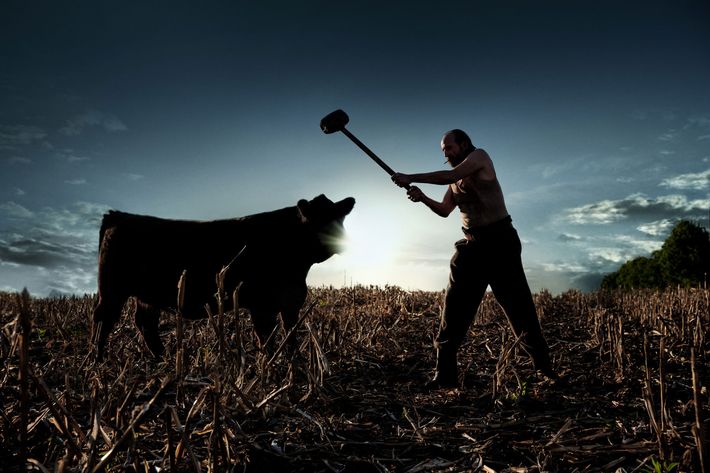
You’re best known as a fantasist, but you’ve also written a significant number of superhero comics over the years. To what extent is the superhero lineup — the Supermen and Spider-Men of the world — a pantheon of gods?
I mean, it is. If you take the DC [Comics] universe and the Marvel [Comics] universe, just the comics, let’s ignore the spinoffs of various kinds, and you go, Okay. At this point, 80 years on, this is one of the largest pieces of fiction ever created. The DC universe is one piece of fiction. There’s been nothing else like it. They are, how many millions of pages at this point? How many millions of words? How many millions of drawings create this mad world that you can understand? You can believe in? You can go to? It’s at once a mirror to the world we live in and it’s an instruction and it’s an aspiration, and what it says about who we are is huge and weird, and when do we need light, funny superheroes and when do we need the dark ones?
And you can say the same thing about gods in a lot of ways.
Exactly.
Alright, you have to catch your train.
I’ve got to text my guy. [Opens jacket, inadvertently revealing a pocket full of pens.]
That’s quite a lot of pens you got there.
It is. And actually, that’s for writing a novel with. That one just got accumulated in Australia. And these two I’m bringing along. I think that one there I’m probably going to be writing with. But this gorgeous little baby is because I left my fancy signing pen.
Ooh, it’s a fountain pen.
It is. They’re all fountain pens. Except for the first one I pulled out. But I needed to find one at home that would sign as well as my beloved signing pen that I’ve been using since 2013. I discovered this one in a box, and somebody must’ve given it to me at some point. I tried it out and went, “You are beautiful. You are perfect. You have fantastic pen-weight. And you write like a dream.” I’m going on a speaking tour and I’m gonna have to sign 500 or 1,000 books before each gig.
I thought I heard you’d retired from the mass-signing game.
I’m done with signing tours. There is a slight difference. You can sign 1,000 books in an hour before a gig, but if the people are standing in line with their thousand books, their two thousand books, that’s four, five, six, seven hours. This year’s signing was [my book] Norse Mythology at Town Hall, New York. I don’t know why I decided to do a signing. I think I was paranoid that nobody would come if I didn’t.
Oh, stop.
No! I think that’s why! I’m going, Why did I do this? That thing where you’re trying to reconstruct motives. I said, Oh, I’ll do a signing afterwards. Maybe nobody will come. But people came. People always come.
This interview has been edited and condensed.


